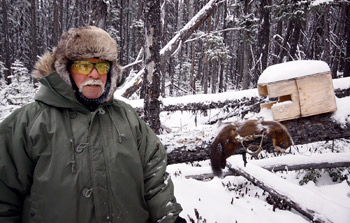|
 |
Democracy – a form of government in which the supreme power is vested in the people and exercised directly by them or by their elected agents under a free electoral system.
Living in a democratic society is the North American way, and for the vast majority of us, we wouldn’t have it any other way. But sometimes democracy can backfire, leaving us with judicial interference and skewed laws.
In many instances, emotional diatribe, when well used, can make a mockery of democracy, which in turn can affect the lives of many, often because of lies and deceit.
I’m talking about animal-rights activists that, when combined with an uneducated urban crowd, can have an effect on our outdoor pursuits of hunting, fishing and trapping.
 |
| “Hunters, anglers and trappers need to fight for each other.” |
As an example, in Montana, a group can get together, write a “Citizens Initiative”, and submit it to their Secretary of State’s Office. It is reviewed and if the language is approved, it is moved forward to their Attorney General’s Office (AGO) for further review. Upon AGO approval, the group sponsoring the Initiative can begin gathering signatures and must gather 25,000 signatures before a given date. If enough signatures are gathered in that time, the Initiative is placed on the ballot for an upcoming election. While I may have skimmed over the process, for the most part, this is how it works in Montana if you want something brought into law. Very democratic.
But this may be where the democratic process can fail, where science takes a backseat, and emotions can rule the day.
Citizens Initiative 169, or I-169, an initiative to ban trapping on public lands in Montana and brought forward by a group known as Trap Free Montana Public Lands, is in the signature-collecting stage and Montana’s 7000 trappers suddenly find themselves in a fight to preserve their heritage. And all because of an animal-rights movement that knows how to play the public for all they’re worth.
According to Toby Walrath, President of the Montana Trappers’ Association and author of the book Wild Pride Montana, Initiative 169 would take away Montana’s most effective wildlife management capability under the guise of protecting people, pets and wildlife.
“These anti-rural organizations are dedicated to eliminating all hunting, trapping, fishing, farming and ranching. They are good at raising money and suing government, but they don’t do anything good for conservation or for wild animals,” said Walrath.
Often, and with little concern over the results of their actions, animal-rights activists can, and do, ruin people’s lives.
The European Union’s 2009 import ban on seal products is a ban, once again, based on the emotional diatribe of the animal-rights movement. This ban was introduced with little thought to the impact it would have on the quality of life of our Inuit peoples that depend on the seal hunt.
As Gordy Klassen recently wrote, “They (the animal-rights activists) are the ones with blood on their hands.” Klassen was referring to the hardships placed upon the Inuit because of the seal product ban and the resulting loss of lifestyle that has led many young Inuit men to take their own lives, having nowhere else to turn.
“For 40 years now, we have seen the spread of false information and propaganda by animal-rights groups to gain political and public support in Europe and end hunting and trade of seal,” said Terry Audla, President of Inuit Tapiriit Kanatami. “The whitecoat seal pup, as one example, is still being used in propaganda campaigns to this day, although it has not been a part of any product trade for the past 30 years.”
“Trade needs to be governed by fact and science, not falsehoods and arbitrary assertions,” said Leona Aglukkaq, who holds several ministerial titles including Minister for the Arctic Council for Canada.
And it doesn’t end there, the animal-rights movement continues to amaze. In Australia, tougher new laws had to be put in place against duck hunting protesters who line up beside legal hunters and race to fallen ducks that are quickly taken to triage tents to be saved. That’s right. Triage tents!
These are just a few examples of the lies, deceit and ridiclous antics used by animal-rights activists to further their agenda in the abolishment of, most notably, hunting and trapping. However, anglers too need to be concerned for they are not dismissed from the rhetoric. These same groups consider the practice of catch-and-release fishing to be a barbaric form of torture and want it stopped.
So, where does it end? When does it end? I hate to say it, but it doesn’t. As long as the pockets of the uneducated can be picked, there will be someone willing to do so, regardless of the consequences. It’s is up to us to remain forever vigilant, and to educate wherever and whenever we can. ■
For previous Outdoor Pursuits click here.
|
|
|
|


